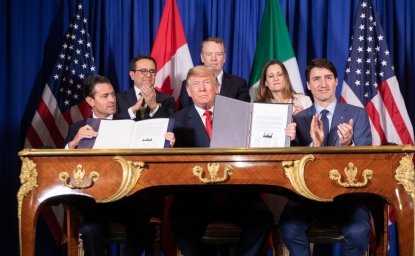155. Shock Therapy In Latin America, Russia, and Eastern Europe


Has fast reform in Russia and some East European countries created the right incentives for an orderly capitalist economy to develop? Or has it opened the door to a tyranny of the strong over the weak? These are crucial institutional questions raised by the shock therapy strategy of transformation in Eastern Europe, Russia, and Latin America.
The dominant method of neo-classical economic reform in the world today-shock therapy-creates severe institutional problems for new democracies. It is more than the specific set of economic measures summed up in the slogan "stabilization, liberalization, privatization." As Jeffrey Sachs has explained, and as the experiences of countries that have undergone it affirm, shock therapy includes a political strategy for implementing radical economic measures. This strategy emphasizes speed in pushing reform through a "window of opportunity" created by extraordinary political events. It suggests that reformers be isolated from political pressures during the planning and implementation of their program, and be granted the power of decree when necessary to overcome opposition by entrenched interest groups. This lack of accountability is thought to enable shock therapy reformers to impose socially-optimal policies more effectively than normal democratic procedures. Otherwise special interest groups linked to the old system could use democratic institutions cynically to undermine reform.
However, a side effect of shock therapy in Russia and in Latin America has been to weaken legal institutions by degrading the powers of the legislature and extending the use of executive decrees. This serves to de-legitimize state power, erode the democratic basis of state authority, undermine the fiscal capacities of the state, and, thus destabilize the political system over the long term.
In every case since 1985, when it was first employed in Bolivia, shock therapy has caused either major constitutional changes or declarations of states of emergency that suspended normal democratic procedures, where it resembles more of a revolutionary than a legal process. It can fundamentally alter the nature of the political system in new democracies. This fact has often been ignored, even though it raises serious questions about shock therapy's relation to the rule of law. In Bolivia, Peru, and Argentina, shock therapy was implemented by neutralizing parliamentary bodies with uses of presidential decree, martial law, and changed constitutions enhancing presidential powers.
Russia followed the Peruvian pattern very closely, launching its shock therapy reforms in 1992 with parliamentary authorization to implement the program by decree for one year. However, as parliament began to oppose the program and to reassert control of economic decisions, it came to loggerheads with the Yeltsin government. In October 1993, Yeltsin defeated the leading parliamentarians by force and promulgated a new constitution later that year which allowed the president to continue to conduct reform by decree.
In Poland shock therapy was passed by parliament in 1989, but as support for the program waned, shock therapists requested special powers and a new constitutional law to allow them to continue reform without parliamentary approval. The request was rejected and Poland's shock therapists were forced out of government in 1991.
Shock therapy's political measures and aggrandized executive privilege also serve to enfranchise elite groups that enjoy exclusive connections to the executive branch. Subjecting state decisions to the will of a legislature necessarily brings a wider range of interest groups into the policy process and expands the number of players competing for influence.
The Czech experience suggests that there are alternative strategies for radical economic reform that are more compatible with parliamentary democracy. The Czech "social-liberal" strategy for transformation tried to establish long-term viability for reforms in a parliamentary system, instead of relying on president-trial support to push reform through in a single breakthrough moment. It excluded the use of special powers or extraordinary measures to push through reform, placing greater emphasis on the rule of law. Czech neo-classical economists were tightly constrained by social democrats within Civic Forum who believed that the economic program had to be popular. This emphasis on popular and parliamentary acceptance is evident and explicit in the reform programs passed in 1990.
Concentrating power in the hands of the executive has not been effective in the post-Communist countries. Though it buys some initial speed and efficiency in implementing reform, it exacts a high price in the long run by opening the door to extensive long-term rent-seeking on the part of a small elite.
Dr. Orenstein spoke at an EES Noon Discussion on February 26, 1998.

The Global Europe Program is focused on Europe’s capabilities, and how it engages on critical global issues. We investigate European approaches to critical global issues. We examine Europe’s relations with Russia and Eurasia, China and the Indo-Pacific, the Middle East and Africa. Our initiatives include “Ukraine in Europe”—an examination of what it will take to make Ukraine’s European future a reality. But we also examine the role of NATO, the European Union and the OSCE, Europe’s energy security, transatlantic trade disputes, and challenges to democracy. The Global Europe Program’s staff, scholars-in-residence, and Global Fellows participate in seminars, policy study groups, and international conferences to provide analytical recommendations to policy makers and the media. Read more


